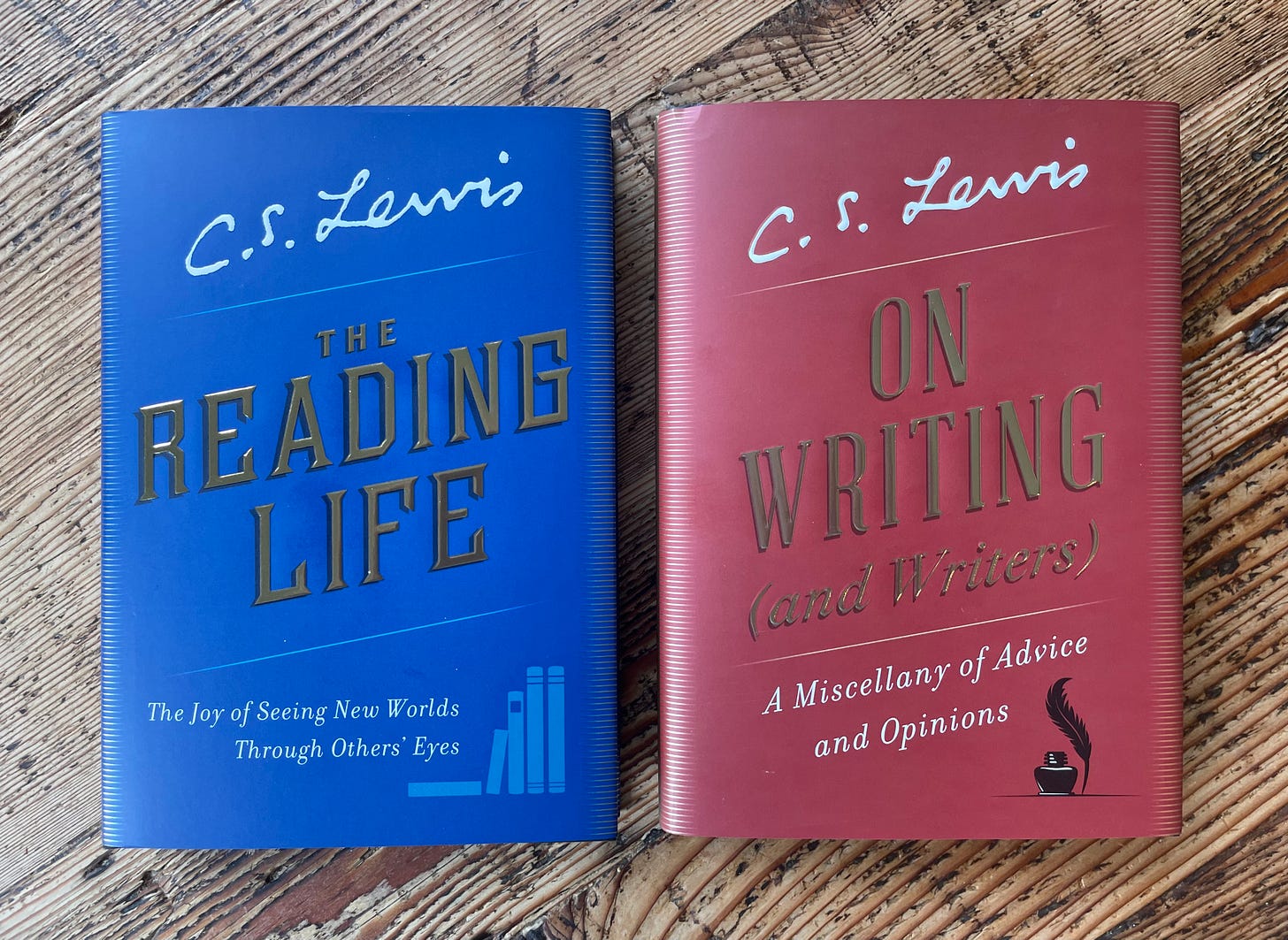C.S. Lewis on Readin’ and ’Ritin’ (but not ’Rithmetic)
Don’t Know Jack about Literature? No Worries. These Two Little Books Can Help
While C. S. Lewis’s industrious editors will probably never release a volume on arithmetic, they have lately produced pithy, posthumous collections of his thoughts on both reading and writing. The first of the pair, The Reading Life, came out in 2019 and the second, On Writing (and Writers), just last year.

The principle virtue of this tidy little duo? Editors David C. Downing and Michael G. Maudlin scoured Lewis’s books, essays, and correspondence for thoughtful reflections, choice commentary, critical observations, pointed opinions, and helpful advice.
In the first volume, Lewis covers both practical and elevated aspects reading. As to the practical, for instance, is it okay to skip portions while reading? Yes: “All sensible people skip freely when they come to a chapter which they find is going to be of no use to them.”
As to the elevated, why do we read?
We seek an enlargement of our being. We want to be more than ourselves. . . . We want to see with other eyes, to imagine with other imaginations, to feel with other hearts, as well as with our own.
“We demand,” he says, “windows.” A beautiful picture of what a book can be.
In the second volume, he shares what he knows about writing, for instance:
That writing should be concrete: “The more abstract the subject, the more our language should avoid all unnecessary abstraction.”
That writing and thinking are part of the same process: “I don’t know what I mean till I see what I’ve said.”
That it’s better to critique than quarrel: “You waste on calling me a liar and hypocrite time you ought to have spent on refuting my position.”
That last one might ruin many people’s primary means of fun on Twitter and Facebook, but public discourse would likely improve if we followed it.
The final third of On Writing (and Writers) is devoted to that parenthetical in the title—Lewis’s sometimes snarky opinions about other writers and broader trends, particularly modernism.
On Jane Austen:
Her books have only two faults and both are damnable. They are too few and too short.
On Ralph Waldo Emerson:
I often pick him up here for an odd quarter of an hour, and go away, full of new ideas. Every sentence is weighty. . . . [What a pity] that such a man should be an American.
On Robert Frost:
One of the few living poets for whom I feel something like reverence.
Such feelings for Frost were not echoed when it came to T. S. Eliot (“The Inferno is not infernal poetry: ‘The Waste Land’ is) or A. E. Housman (“What a terrible little book it [The Shropshire Lad] is”).
When it came to George Orwell, Lewis much preferred Animal Farm to 1984. Regarding the latter, he said, “It seems to me . . . to be merely a flawed, interesting book; but the Farm is a work of genius which may well outlive the particular and (let us hope) temporary conditions that provoked it.”
Lewis mentions many others, including: Percy Shelley, Philip Sidney, Dorothy L. Sayers, Charles Dickens, Leo Tolstoy, D. H. Lawrence, Henry James, Rudyard Kipling, Nathaniel Hawthorne, Francis Bacon, Emily Brontë, Mark Twain, Machiavelli, Shakespeare, Beatrix Potter, and his friend J. R. R. Tolkien. A favorite entry of mine is this take on Laurence Sterne’s Tristram Shandy:
I have read today . . . some ten pages of Tristram Shandy and am wondering whether I like it. It is certainly the maddest book ever written. . . . It gives you the impression of an escaped lunatic’s conversation while chasing his hat on a windy May morning.
Sounds like a recommendation to me! And you can take this as my recommendation of both these little books. Just don’t waste any time hoping for the third in the trilogy in which the Oxford don at last unlocks long division, algebra, and geometry.
Thanks for reading! If you enjoyed this post, please hit the ❤️ below and share it with your friends.
Not a subscriber? Take a moment and sign up. It’s free for now, and I’ll send you my top-fifteen quotes about books and reading. Thanks again!
Related posts:







Maybe the ‘rithmetic volume is a piece of fan fiction waiting to be written. The Great Divorce Between the X and Y Axis? The Measuring Tape Letters? 🥴
Well, I am late o the party. Thanks for sharing about these!